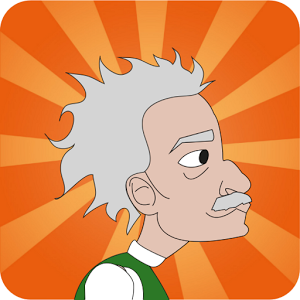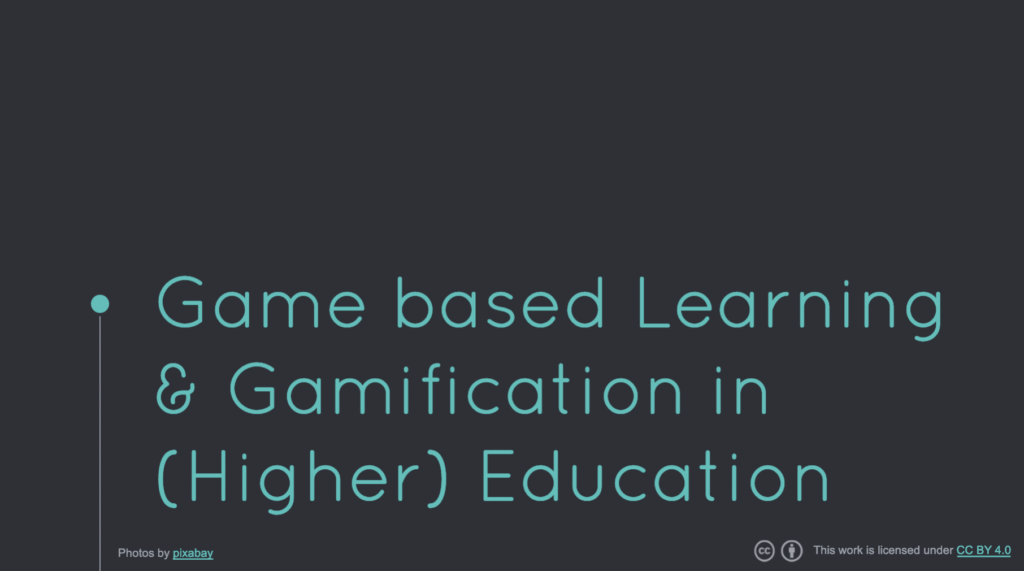Here are the slides of my keynote talk about “Game based Learning & Gamification in (Higher) Education” at 2. FHGR Gamification & Serious Games Event in Graubünden (Switzerland):
[article] A Voice-Enabled Game Based Learning Application using Amazon’s Echo with Alexa Voice Service: A Game Regarding Geographic Facts About Austria and Europe #research #TEL #Alexa
Our first resarch using Amazon’s Alexa for Learning are now published, named “A Voice-Enabled Game Based Learning Application using Amazon’s Echo with Alexa Voice Service: A Game Regarding Geographic Facts About Austria and Europe” in the International Journal of Interactive Mobile Technologies (iJIM) .
Abstract:
Journal’s Homepage
An educational, interactive Amazon Alexa Skill called “Österreich und Europa Spiel / Austria and Europe Game” was developed at Graz University of Technology for a German as well as English speaking audience. This Skills intent is to assist learning geographic facts about Austria as well as Europe by interaction via voice controls with the device. The main research question was if an educational, interactive speech assistant application could be made in a way such that both under-age and full age subjects would be able to use it, enjoy the Game Based Learning experience overall and be assisted learning about the Geography of Austria and Europe. The Amazon Alexa Skill was tested for the first time in a class with 16 students at lower secondary school level. Two further tests were done with a total of five adult participants. After the tests the participants opinion was determined via a questionnaire. The evaluation of the tests suggests that the game indeed gives an additional motivational factor in learning Geography.
[Link to full article @ ResearchGate]
[Link to full article @ Journal’s Homepage]
Reference: Bilic, L., Ebner, Markus, Ebner, Martin (2020) A Voice-Enabled Game Based Learning Application using Amazon’s Echo with Alexa Voice Service: A Game Regarding Geographic Facts About Austria and Europe, International Journal of Interactive Mobile Technologies (iJIM), 14 (3), pp. 226 – 23
[CallForPaper] Mini Track on Gender Sensitive GBL #ECGBL19
Die “13th European Conference on Games Based Learning (ECGBL)” findet heuer in Odense, Denmark statt und ich darf hier auf einen Mini-Track zu Gender Sensitive GBL hinweisen. Abstract ist bis zum 14.3.2019 einzureichen
[publication] German Language Training App for Primary School Children #LearningAnalytics #iderblog
At this year Ed-Media conference in Amsterdam we published our research work about “German Language Training App for Primary School Children”.
Abstract:
Mobile apps and the gaming industry experienced continuous growth and popularity over the last couple of years. While children have always played games for fun, researchers, recognized the promising possibilities behind games in the field of education. As nearly every child is in possession of a mobile device today, the sector of digital game-based learning is of special interest. Since primary school pupils often find it difficult to acquire good language skills, this research study deals with the creation of a prototype for tablets to support language training within primary schools. For the evaluation, a field test among children in Austria was conducted in order to see whether benefits could be observed. The extremely positive field test strengthened our approach and further motivated the participants to play the game even after the test was finished.
Reference: Schwaiger, A., Ebner, M. & Ebner, M. (2018). German Language Training App for Primary School Children. In Proceedings of EdMedia: World Conference on Educational Media and Technology (pp. 1202-1210). Amsterdam, Netherlands: Association for the Advancement of Computing in Education (AACE).
[publication] How can Gamification Improve MOOC Students Engagement?
Our contribution to this year 11th European Conference on Games Based Learning (ECGBL) is about our Gamifications experiments within MOOCs. The publication is titled “How can Gamification Improve MOOC Students Engagement?”
Abstract:
Massive Open Online Courses (MOOCs) require students’ motivation either intrinsically or extrinsically to complete any of its courses. Even though MOOCs enjoy great popularity and bring many benefits to the educational community, some concerns arise with MOOC advancement. In fact, MOOCs are affected by low completion rate and face issues with respect to interactivity and student engagement along MOOC duration, which may convert student excitement to boredom and then drop out at any stage. A key result of research in the past couple of years has proved that students’ engagement in MOOCs is strongly related to their activities online. These activities are related to the interaction between student and logging in the MOOC, reading and writing in the MOOC discussion forum, watching videos and doing quizzes. In this research paper, we present our research in deploying a gamification mechanic in MOOCs to increase student engagement. The gamification approach relies on weekly feedback to drive student intrinsic and extrinsic motivation. Following learning analytics on students’ data from a MOOC offered in 2014, 2015, and 2016, the outcome of this approach showed an obvious increase in students’ activity and engagement in discussion forums, login frequency and quiz trials. The active students’ cohort allotment has increased in comparison with previous versions of the same MOOC as well as the completion rate has incremented up to 26% of the total number of participants.
Reference: Khalil, M., Ebner, M., & Admiraal, W. (2017). How can Gamification Improve MOOC Students Engagement?. In proceedings of the European Conference on Game Based Learning, Graz, Austria, (pp. 819-828
[publication] Game Based Learning Through Near Field Communication #NFC #research #tugraz
Our publication about “Game Based Learning Through Near Field Communication” is now published in the book Game-Based Learning: Theory, Strategies and Performance Outcomes.
Abstract:
Near Field Communication (NFC) is a technology mainly known from the payment and ticketing sector. Due to its availability on smartphones NFC provides a far untapped potential for a variety of different applications. As part of researches regarding NFC and its usability in educational areas, the operational capability of NFC has been tested in the field of game based learning. The result was an Android-based quiz application (“NFCQuiz”) working in multiplayer mode, meaning that several players can exchange their answers through the use of NFC during the game. The application provides educators the possibility to store his/her own questions and answers on a tag. During the game one player reads the tag and can send the contained information to multiple players over Android Beam. The exchange of the given answers and the calculation of the leader board are in turn done over a NFC connection.
Such an application is expected to bring different benefits. Both, question generation and data exchange are handled over NFC. As a result no internet access is needed for participating in the game. Since the used tags are re-writable there are basically no limits in term of reuse. Another benefit resulting from the usage of tags is that parents/teachers can control the used questions and answers. A NFC-based game is also supposed to give players an additional interactive effect by holding the phones for synchronization, which in turn keeps the participants interested.
This research work gives an overview of the “NFCQuiz” application regarding its functionality and implementation. Moreover we discuss the advantages and disadvantages of the app with respect to similar games and the overall potential of NFC in the educational sector.
[Draft article @ ResearchGate]
Reference: Lamija, D., Ebner, M. (2017) Game Based Learning Through Near Field Communication. Game-Based Learning Theory, Strategies and Performance Outcomes. Youngkyun B. (ed.). Nova publisher. pp. 295-322
[iPhone, app] MathEvo #tugraz #iOS #AppDevelopment
 Nun gibt es unser Spiel MathEvo auch für iOS, für Android wurde es bereits hier angekündigt. Viel Spaß mit dem Donkey Kong Revieval 🙂 .
Nun gibt es unser Spiel MathEvo auch für iOS, für Android wurde es bereits hier angekündigt. Viel Spaß mit dem Donkey Kong Revieval 🙂 .
MathEvo is an educational game for children.
The goal is to solve simple math problems, for which you get rewarded with stars. With these stars you are able to unlock new backgrounds and character models.
The gameplay is based on the old Donkey Kong game, where you have to climb ladders to reach the goal.
Each climed ladder adds another piece to the equation showing in the top right corner. If the equation is wrong, the right path will be displayed.
All levels are randomly generated.
[publication] Game-Based Learning with the Leap Motion Controller #GameBasedLearning #research
Our chapter on “Game-Based Learning with the Leap Motion Controller” within the book Handbook of Research on Gaming Trends in P-12 Education is published now.
Abstract:
Learning through games is a promising field for the future of education. In this research study the authors describe the development process of an educational application, a game targeting P-12 students. This application is meant to be used with the Leap Motion Controller, a small 3D infrared camera, which while in use, tracks the user’s hands and finger movements in the 3D space. The chapter describes the application itself and presents the outcomes of a field study, which was carried out with a small group of students at an elementary school. It can be pointed out that there is a huge potential of using innovative input devices in school education.
[Link to draft article @ ResearchGate]
[Link to full article @ IGI-Global]
Reference: Ebner, M. & Spot, M. (2015) Game-Based Learning with the Leap Motion Controller. Russell, D., & Laffey, J. M. (Ed). Handbook of Research on Gaming Trends in P-12 Education. Hershey, PA: IGI Global. pp. 555-565
Seminararbeiten AK Technology Enhanced Learning
Im Rahmen des Seminars “AK Technology Enhanced Learning” haben wir unter anderem vier Kapitel von L3T behandelt. Als Seminararbeit wurde die Aufgabe gestellt, die im Kapitel vorhandenen Übungsfragen zu beantworten. So haben wir nun ein Ergebnis für die Kapitel “Bildungstechnologien im Sport“, “Game-Based Learning“, “Multimediale und interaktive Materialien” und “Technologieeinsatz in der Schule” vorliegen, welches wir gerne teilen:
Klicken Sie auf den unteren Button, um den Inhalt von www.slideshare.net zu laden.
[master] The Use of Modern Controller Devices at Schools: Game-Based Learning with the Leap Motion
Norbert did his master thesis about the usage of a leap motion controller for learning with school children. His master defense “The Use of Modern Controller Devices at Schools: Game-Based Learning with the Leap Motion” is now online available:
Klicken Sie auf den unteren Button, um den Inhalt von www.slideshare.net zu laden.

